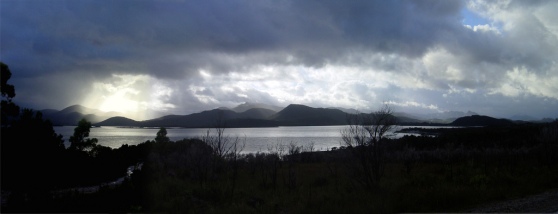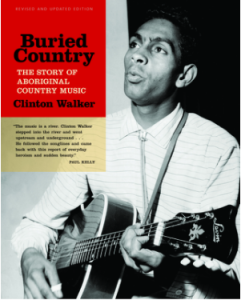
Photo (CC) Robert Cutts @ Flickr
*
A walk in the Coal River Valley with Christopher Koch
Two figures move along a deserted road
at the centre of a landscape of farms
and forest-capped slopes. A single car passes,
its driver raising one finger off the wheel
in the traditional countryman’s
salute. The dust on the road is as real
as the images brought into someone’s
mind, of the estuary and its arms
wrapped around townships and sheep-grazed grasses,
….waters that have flowed
down from mountainsides, long extinct cones
of ancient volcanoes. Of the two
walkers, one is myself, while the other
is a man who wears a cap one might see
on a Greek fisherman, a man with shrewd
eyes and a subtle grin, the delicacy
of an old watchmaker somehow imbued
in his manner, even if that is not who
he happens to be. Over the fields a plover
….tips its wings and moans
like a distant child. The thorny hedges
beside the road flourish scarlet berries
the size of tear drops; over the hillside
rows of grapevines are covered in plastic
nets, that flutter in the breeze like flags. Sheep
move slowly in a field, touching their thick
lips to the dust-pale earth. A stone house, deep
among shade-giving conifers; beady-eyed
swallows in the eaves, swooping in flurries
….like swarms of midges;
small birds among the vine-rows. Another house
beside the road, red brick with a tower
on one corner – and my companion tells
the history behind the tower’s construction,
and talks about crop growth and old wealth.
His knowledge stretches over the fields, a distraction
from his thoughts about the declining health
which means he must suffer from hour to hour.
From far away, a sound of muffled bells;
….a scattering of cows
steeped in long grass; hills named after household
objects, sugarloaf, cap and bonnet, and
beyond those hills the unseen mountains, jagged
as Switzerland; lakes in hidden valleys,
like the waterways of Europe; small towns
laid out and built almost two centuries
before, beside creeks on flatlands and downs.
The earliest occupants of this land
left no buildings or sculptures, and wore rugged
….cloaks against the cold;
and yet while Napoleon was still alive,
while Lord Byron journeyed among the Greeks,
stone walls and bridges, churches and barracks
arose in forest clearings and on the banks
of rivulets – walls that remain standing
to this day. Buckets and watertanks
in cottage gardens; pathways winding
like the quiet voice of the one who speaks
to me now, of politics and income tax,
….the will to survive,
and the hazards of idealism. A hand
gestures as the words take shape in his thought,
about the past and the present. This place
with its contours and its watercourses
has drawn him back whenever he has meant
to leave. A training track for racehorses
behind a modern farm house, shaped like a tent,
prompts a tale. All through his life he has sought
peace: this landscape written over his face,
….Van Diemen’s Land.
.
*
.
Immortal
New Year’s Eve. A fireworks display
above the harbour; immense crowds pack
the shoreline. Laughter and drinking
and senseless brawls. Policemen make their way
….past fold-out chairs
and picnic rugs, their flashlights blinking.
The noise is like that of an airborne attack,
….with lights and explosions. Stairs
that lead to vantage points are bordered
by shining faces. Among them, a teenage boy
is caught up in an argument
the police have to settle, and is ordered
….to leave. He goes
off, looking for an unlighted easement
that will lead to where he might rejoin
….his friends. To get there, he follows
a stranger, another boy, down
a laneway and into such darkness
that neither can see where their feet
ought to be placed, in a part of town
….no-one visits
in daylight, the rock-scattered, steep
embankment above a long-disused
….railway siding. Some bits
of what is to follow must remain
fixed in his memory. The ground slips,
and then he is tumbling in air,
bouncing off stones and stumps down to the old train
….tracks, where he sprawls
with bruises and broken bones, aware
mainly of the sharpness of shoulderblades and hips.
….Afterwards, phone calls
and ambulance sirens, confusion
and lights and cameras, a person’s broken form
strapped onto a stretcher to be winched
up the cliff face. The next day’s television
….news will portray
the scene, as two faceless figures are inched
toward safety’s open doors. He comes to less harm
….than someone else may
have done, after such a tumble.
Later, in the ambulance, it seems as if
he is in a dream full of blinding light.
His friends come to find him in the hospital.
….“I was immortal,
I once thought,” he will soon write
on Facebook. “Then I fell off a cliff.
….Now I know I’m immortal.”
.
*
.
Make my Breakfast
My cousin’s father phoned her,
even though they were estranged,
on Christmas morning, to complain
about her mother.
She would not cook his breakfast,
he said. He had managed businesses,
negotiated at the highest
levels, terrified his staff,
but still he did know how
to heat a slice of toast.
My cousin drove across the city’s suburbs
in morning sun. Leaves on the great trees hung down
like sheets of discarded gift wrap.
At the top of a long driveway
the house was an empty box, brittle
as cardboard. In the kitchen a tap
was dripping as he sat at the table.
“Make my breakfast,” he repeated.
In those times it was not unknown
for a man to be unable
to boil a saucepan of water. Instead
my cousin went to the darkened bedroom.
A figure lay under the sheets.
Her mother was dead.
.
***
ABOUT THE POET
Jamie Grant was born in Melbourne and now lives in Sydney. He has worked as an advertising copywriter, a trainee teacher, a publisher’s representative, a bookseller, a proofreader, and as a freelance editor and journalist. He was editor of the William Heinemann Australia poetry series and poetry editor of The Bulletin. He has published eight collections of his own poetry and has edited five anthologies, including 100 Australian Poems You Need to Know and 100 Australian Poems of Love and Loss. His latest book is Glass on the Chimney (2014).



